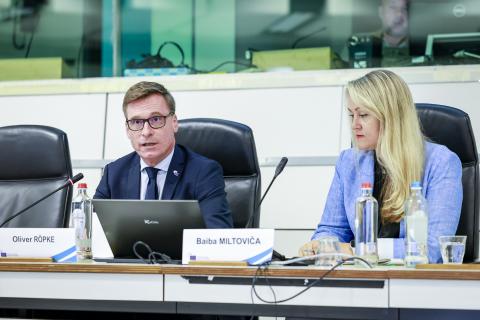European Economic
and Social Committee
Ensure affordable energy supply for vulnerable people, households and SMEs
At its annual conference on energy poverty, the European Economic and Social Committee (EESC) took stock of the alarming spike in the number of energy poor over the past year. The EESC sends a strong message to EU leaders and puts forward concrete proposals to achieve an affordable and stable energy supply while supporting vulnerable people, households and SMEs.
The fourth annual energy poverty conference held in Brussels on 26 June 2024 highlighted that the number of people in Europe who cannot afford to heat their homes adequately has risen sharply.
To try to address these issues, the conference on Affordable Energy: Turning civil society views into action focused on proposals to, on the one hand, ensure an affordable and stable energy supply in line with a just green transition and, on the other, support vulnerable people, households and SMEs.
The rise of inequalities cannot be addressed through a piecemeal approach, but needs to be dealt with comprehensively by involving and consulting civil society.
Against this background, the EESC has been calling for the creation of an ambitious political coalition to work on a comprehensive action by all stakeholders since 2021.
The EESC is committed to being at the forefront of these endeavours and to press the EU Member States and EU institutions for:
- a fairer transition – there is a constant need to improve access to employment, social inclusion and decent living conditions for all;
- reducing energy poverty through EU policies aimed at ensuring fair and transparent pricing;
- jointly tackling the issue of the cost of energy disproportionally affecting the most vulnerable groups, including women, young people and persons with disabilities.
According to Eurostat 2024 data, 10.6% of Europeans, approximately 48 million people, were unable to keep their homes sufficiently warm in 2023. These figures have gone up significantly, compared to 9.3% in 2022 (about 42 million people across Europe) and 6.9% in 2021 (about 31 million).
There are three main reasons why many people end up having to reduce their energy consumption to a degree that negatively impacts their health and wellbeing: a high proportion of household expenditure spent on energy, low income and low energy performance of buildings and appliances.
Rising inflation and international conflicts are just a few examples of the many events which are adding pressure on low-income households, increasing the risk of poverty. It is indeed on the poorest people that the burden of energy costs is much heavier, as they spend a larger part of their budget on energy bills.
Quotes from high-level speakers
‘Citizens are worried about paying their energy bills. The cost of living and energy crises caused a steep rise of energy prices. The reality is that not every European can afford to pay for energy. This is a situation we cannot accept. Every European should be able to afford to heat their house regardless of their income. We need to address energy affordability through a multi-faceted political approach. Governments must implement targeted subsidies, social tariffs and energy assistance programmes to alleviate the financial burden on low-income households and policies should also encourage energy providers to offer fairly structured prices that protect vulnerable consumers.’
Oliver Röpke, President of the European Economic and Social Committee (EESC)
‘Currently, the question of maintaining a stable energy supply in Europe unfortunately finds itself at odds with the green transition and affordable prices. However, there is no question of opposing them, a just transition is possible and I encourage European initiatives in pursuit of this. EU institutions, Member States and civil society organisations are called upon to play a central role in this quest. Facing the challenges of our time, it is imperative that we work together to protect the most vulnerable and build a future where affordable energy is a right for all, not a privilege for a few.’
Karine Lalieux, Belgian Minister of Pensions and Social Integration, in charge of Persons with Disabilities, Combating Poverty and Beliris
‘The reality we face shows that we need to keep energy affordability high on our agendas. We are committed to developing a strategy for affordable, secure and sustainable energy that promotes energy communities and ensures fairness for the most vulnerable. Our aim is to achieve Europe’s strategic autonomy and competitiveness, as well as a greener and more sustainable economy and society. This requires making an integrated EU energy market a reality and giving citizens, economic operators and consumers the chance to play a proactive role.’
Baiba Miltoviča, President of the Section for Transport, Energy, Infrastructure and the Information Society (TEN), EESC
Work organisation
Downloads
-
Conference on Affordable Energy
